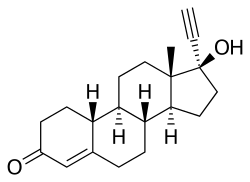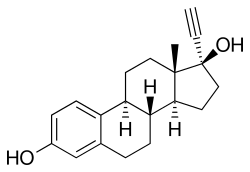Primodos
Primodos was a hormone-based pregnancy test used in the 1960s and 1970s that consisted of two pills that contained norethisterone (as acetate) and ethinylestradiol.[1][2] It detected pregnancy by inducing menstruation in women who were not pregnant. The presence or absence of menstrual bleeding was then used to determine whether the user was pregnant.[1] In South Korea it was also used, "perhaps as a double dose" to induce abortions.[3]
| Primodos | |
|---|---|
| Purpose | Determine if pregnancy is present |
When first made available for sale in the UK in 1959,[4] the pregnancy test in use involved injecting toads with a woman's urine.[3] It was withdrawn from sale in the UK in 1978.[4] Primodos was produced by Schering AG, a German company taken over by Bayer AG in 2006.
Another hormonal pregnancy test called Duogynon was in use in Germany during the same general time period.[1]
History
In the 1960s, Dr. Isabel Gal conducted research at Queen Mary's Hospital for Children that showed a link between use of the drug and severe birth defects.[5] A review by the Committee on Safety of Medicines in the 1970s concluded that the product should not be used by pregnant women.[2] Litigation in the 1980s regarding these claims ended inconclusively, with proceedings being discontinued, with the court's approval.[1][6] A review of the matter by the Medicines and Healthcare products Regulatory Agency in 2014 assessed the studies performed to date, and concluded that it found the evidence for adverse effects to be inconclusive.[1][7]
The report of an expert working group of the UK Commission on Human Medicines published in November 2017 concluded there was no “causal association” between Primodos and severe disabilities in babies. The expert group recommended that families who took a hormone pregnancy test and experienced “an adverse pregnancy outcome” should be offered genetic testing to establish whether there was a different underlying cause.[8]
Independent Medicines and Medical Devices Safety Review
An independent review by Baroness Cumberlege, the Independent Medicines and Medical Devices Safety Review, reported in 2020 that "avoidable harm" resulted from the use of Primodos. It recommended that "the Government should immediately issue a fulsome apology on behalf of the healthcare system to the families affected by Primodos".[9]
Dr Bill Inman, of the Committee on Safety of Medicines, who had investigated Primodos was referenced in a Schering memo stating "...he has destroyed all the material on which his investigation is based, or made it unrecognizable, which makes it impossible to trace the individual cases taken into the investigation. I understood Dr. Inman that he did this to prevent individual claims from using this material."[9]
Baroness Cumberledge said, in relation to Bayer, "I think they should not only apologise; they should recognise what has happened and give ex-gratia payments to these people who have suffered." [10]
References
- Sarah Rainey (12 May 2014). "'Is this the forgotten thalidomide?'". Daily Telegraph. Archived from the original on 14 July 2017.
- Department of Health, Hansard, HL Deb, 26 October 2010, c264W
- "UK pregnancy test drug Primodos used for abortions in Germany".
- "Hormone pregnancy tests". Medicines and Healthcare products Regulatory Agency. Archived from the original on 12 May 2014. Retrieved 12 May 2014.
- Montuschi, Mike (2018-03-13). "Isabel Gal obituary". the Guardian. Retrieved 2018-06-21.
- "Jury still out in pregnancy test case", New Scientist, 8 July 1982, page 79
- "Assessment of historical evidence on Primodos and congenital malformations – a synopsis" (PDF). Medicines and Healthcare products Regulatory Agency. 9 April 2014. Archived from the original (PDF) on 4 December 2014. Retrieved 12 May 2014.
- "Report of the Commission on Human Medicines Expert Working Group on Horrmone Pregnancy Tests" (PDF). UK Government Web site. 15 November 2017. Retrieved 15 November 2017.
- Cumberledge, Baroness. "First Do No Harm: The report of the Independent Medicines and Medical Devices Safety Review" (PDF). Independent Medicines and Medical Devices Safety Review. Retrieved 8 July 2020.
- Farrell, Jason. "Primodos scandal: Relief for campaigners as review demands compensation for victims of hormone pregnancy test". Sky News. Sky News. Retrieved 8 July 2020.
Further reading
- Olszynko-Gryn J, Bjørvik E, Weßel M, Jülich S, Jean C (August 2018). "A historical argument for regulatory failure in the case of Primodos and other hormone pregnancy tests". Reproductive Biomedicine & Society Online. 6: 34–44. doi:10.1016/j.rbms.2018.09.003. PMC 6234516. PMID 30456319.

